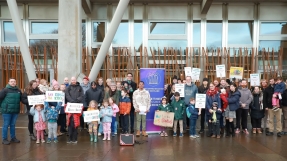Tutu supports decriminalisation of homosexuality worldwide
"In the future, the laws that criminalise so many forms of human love and commitment will look the way apartheid laws do to us now – so obviously wrong," Tutu wrote in a recent issue of The Lancet.
"Never let anyone make you feel inferior for being who you are. When you live the life you were meant to live, in freedom and dignity," he added.
Tutu is the head of the mission Desmond Tutu HIV Foundation, based in Cape Town, South Africa and designed to prevent the spread of HIV and Aids, and conduct research.
Along with an international team of researchers, Tutu argues that the homosexual stigma that accompanies HIV and Aids has prevented proper global consideration of how the virus can proportionately affect both heterosexual and homosexual individuals.
Additionally, the article argues that countries that criminalise homosexuality often associate HIV and Aids with being homosexual, and therefore do not provide proper medication, HIV testing, condoms, and counselling for the disease.
"The struggle for equity in HIV services is likely to be inseparably linked to the struggle for sexual minority rights-and hence to be both a human rights struggle, and in many countries, a civil rights one," the paper reads.
Genevieve Edwards, director of health improvement for the AIDS research organisation Terrence Higgins Trust, told a gay activist website that a country's acceptance of homosexuals would allow more homosexuals to come forward for testing, and therefore increase global knowledge of HIV.
"If you spend your life being told you are a second-class citizen, you have less motivation to take care of yourself and you're more likely to take risks with your health. To improve someone's self-care you need, first and foremost, to improve their self-esteem," Edwards said.
The paper ultimately requests that those countries that criminalize homosexuality, predominately in the Middle East and Asia, decriminalise it so researchers may have a better understanding of the true scale of HIV and Aids in homosexual men and therefore how to better tackle the issue on a global scale.
In March 2012, Nobel peace prize winner and president of Liberia, Ellen Johnson Sirleaf, defended her country's law criminalising homosexuality, telling former prime minister Tony Blair in an interview with The Guardian: "We like ourselves just the way we are [...] we've got certain traditional values in our society that we would like to preserve."
"Voluntary sodomy" in Liberia is classified as a misdemeanor and punishable by up to one year in prison.
Additionally, ex-wife of former Liberian president Charles Taylor, Jewel Howard Taylor, drafted a bill which would make gay marriage a crime punishable by up to 10 years in jail.
"[Homosexuality] is a criminal offense. It is un-African. It is a problem in our society. We consider deviant sexual behavior criminal behavior," Taylor told The Guardian in March.
"We are just trying to strengthen our local laws. This is not an attempt to bash homosexuals," she added.
Tutu is a South African activist and retired Anglican bishop who has become a prominent activist in gay rights, apartheid, poverty, and women's rights. He has maintained a somewhat liberal view of homosexuality, previously saying that although it is acceptable for church leaders to be homosexual, they should maintain celibate.
The Lancet article on AIDS comes at the beginning of the International AIDS 2012 Conference, taking place in Washington DC.













